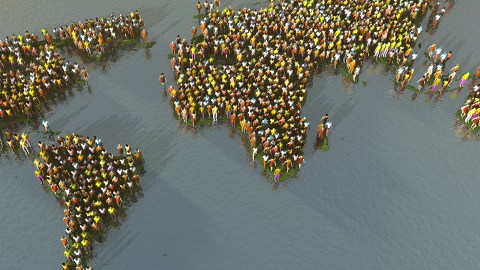Aldous Huxley on Overpopulation: Are Doomsayers Crazy or Acutely Aware?

The human population is growing rapidly. A quick glance at the population-counters from Worldometers reveals that far more people are being born than are dying everyday. If the amount of available natural resources increases more slowly than the human population, are we doomed as a species to catastrophe? As early as 1798, the English scholar Thomas Malthus (1766-1834) meticulously detailed and described concerns about these relative rates and their implications for human civilization.
In An Essay on the Principle of Population, Malthus observed – having accumulated and studied a wealth of empirical data about birth-rates, death-rates, childrearing, and more – that the rate at which the production of food increases is categorically slower than the rate at which the human population increases. More specifically, he argued that food-production grows arithmetically (i.e., linearly) whereas the population grows geometrically (i.e., exponentially).
Although Malthus himself did not conclude that people are doomed, several of his readers did. Scholars and commentators continue to invoke his arguments to suggest that unchecked population growth presents a grave danger. Malthus himself, writing before the industrial revolution, underestimated how high the population could get. Still, given how advances in science and technology have allowed the human population to surge through continual technological innovation, many suggest that population growth is nothing to worry about: systems of incentives will allow civilizations to adapt and grow.
The renowned author and philosopher Aldous Huxley (1894-1963) argued that the implications of unchecked post-industrial population growth would be very bleak, indeed. He is famous for, among other works, his 1932 novel Brave New World, a story of a dystopian world in which populations are controlled and placated thorough intellectual censorship, deliberate conditioning, and omnipresent access to hedonistic pleasures. In 1958, Huxley reflected on that novel and the ways in which society, as he understood it, had developed toward that vision of the future years later in a work of non-fiction, Brave New World Revisited. In it, he describes just how bleak the problem of rapid population growth’s strain on resources is:
At the rate of increase prevailing between the birth of Christ and the death of Queen Elizabeth I, it took sixteen centuries for the population of the earth to double. At the present rate it will double in less than half a century. And this fantastically rapid doubling of our numbers will be taking place on a planet whose most desirable and productive areas are already densely populated, whose soils are being eroded by the frantic efforts of bad farmers to raise more food, and whose easily available mineral capital is being squandered with the reckless extravagance of a drunken sailor getting rid of his accumulated pay.
Huxley observes that the human population continues to grow rapidly (as does the rate at which this growth accelerates) at a time when the strain on natural resources is close to a threshold. If Huxley is right on these counts, then no increases in agricultural efficiency will be able to accommodate the rapidly surging populations of the world.
Now over a half a century later, we can ask ourselves whether Huxley’s description of population growth an accurate characterization of modern trends. At first glance, it might not seem so. The World Bank’s data on changes in the rate of population growth over the past few decades shows that, although the rate of growth is still positive (i.e., people are being born more quickly than are dying), that rate is slowing down and is lower now than it had been for several years.
Regarding the legitimacy of the threats of overpopulation, however, this might be misleading. Considering these data in the broader context of population growth since the beginning of agriculture, the population continues to surge at unprecedentedly high rates. According to the United States Census Bureau, the world population was approximately five million in 8000 BC. Around 15th century AD, the number had grown to between 350 million and 374 million. So over 9.5 millennia, the world population grew by about 345 million. In the 20th century alone, the world population grew by 4.35 billion: from 1.65 billion to 6 billion. For the world population to increase at a rate of billions per century or to more than quadruple within a century is unprecedented in the history of our species. Given the declining growth rates, the United Nations Population Division projected that the population would take about two centuries to double again. While that is indeed meaningfully slower than the population growth of the 20th century, increasing the population by over five billion in two centuries is far from negligible. Even if it reflects a decrease in the growth rate, Huxley seems right to be wary of the strains on natural resources. It is not apparent that increases in agricultural output will scale appropriately with increases in the world population.
What would be the implications of such a monumental shift in the demand for finite, life-sustaining resources? According to Huxley, such consequences of rampant population growth will facilitate the increasing centralization of power and authority of governments. He described in Brave New World Revisited:
Whenever the economic life of a nation becomes precarious, the central government is forced to assume additional responsibilities for the general welfare. It must work out elaborate plans for dealing with a critical situation; it must impose ever greater restrictions upon the activities of its subjects; and if, as is very likely, worsening economic conditions result in political unrest, or open rebellion, the central government must intervene to preserve public order and its own authority. More and more power is thus concentrated in the hands of the executives and their bureaucratic managers.
Overpopulation will precipitate huge economic and humanitarian crises for which it will be necessary for governments to intervene in a direct and dynamic way. Thus, it might not be merely an irrational doomsday hypothesis that unrestrained global population growth could precipitate an unprecedented expansion in the authority and control of the state. Given modern concerns for excessive concentrations of political power, this merits critical reflection.
How could we resolve the impending problems of population growth? The drastic solution in Brave New World is for the government to control the population directly: natural reproduction is abolished and the government controls exactly how many people there are in each social class by manufacturing them in factories explicitly reminiscent of Henry Ford’s assembly lines. Some have posed less dismal solutions. World Population Balance, for instance, advocates implementing national and global campaigns for increasing awareness regarding the dangers of accelerating population-growth. The organization also calls for the formation of a think tank and campaigns for engagement with these issues with the participation of experts on biodiversity, poverty, and more. In any case, it seems that intervention by governments is necessary to addressing these issues. If such problems are raised, discussed, and addressed today, we can avoid the extreme takeover by the government described in Brave New World.
Malthus’s contemporaries escaped the Malthusian nightmare with the advent of the Industrial Revolution. Today, we look forward to an even more perilous predicament. What will the next revolution look like? If this subject conjures up dystopian futures and existential crises, distinguished comedians Bill Burr and Doug Stanhope, both of whom have characterized overpopulation as a problem and population control as a solution in their performances, can help us cope by means of their potent if grizzly humor.





